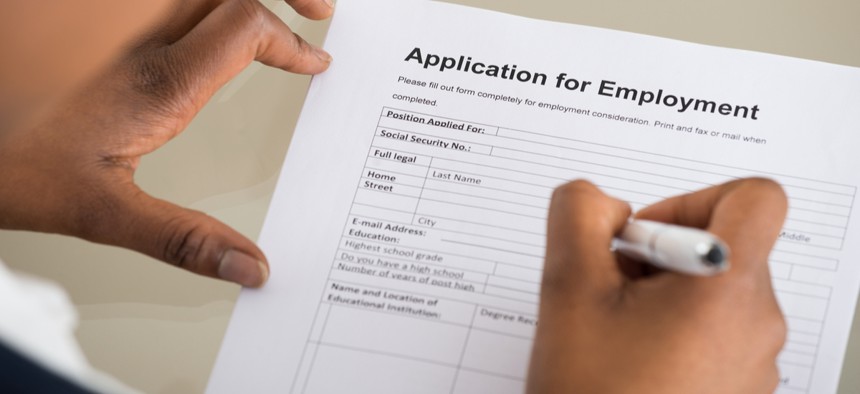The Pros and Cons of 'Banning the Box'

The policy has proven effective in multiple cities but can have unintended negative consequences, including racial bias, researchers found. Shutterstock
New Mexico became the 12th state to prohibit private employers from asking about criminal records on job applications, a practice designed to reduce recidivism by helping ex-offenders gain employment.
Private employers in New Mexico are now prohibited from asking prospective employees about their criminal records on job applications under legislation that became law this month.
The bill, signed by Gov. Michelle Lujan Grisham in April, allows companies to inquire about criminal records later in the hiring process, after evaluating the applicant’s skills and employment history. Proponents of the legislation said it aims to give all jobseekers the opportunity to be judged solely on their merit and ability rather than their pasts.
“It’s a fact of life—people make mistakes. They should have a chance to rebuild their lives once they exit the criminal justice system,” state Rep. Alonzo Baldonado, a Republican who co-sponsored the bill, said in a statement. “This law gives them that chance.”
With New Mexico's law change, 34 states and more than 100 cities have enacted laws requiring government agencies to “Ban the Box," referring to the box that applicants are typically required to check to indicate if they have a criminal record. Just 12 of those states (California, Connecticut, Hawaii, Illinois, Massachusetts, Minnesota, New Jersey, New Mexico, Oregon, Rhode Island, Vermont and Washington) extend the policy to private employers. Where it has passed, the measure has typically garnered broad bipartisan support, based on the premise that ex-offenders who have trouble finding work are more likely to reoffend and end up cycling in and out of the criminal justice system, placing a financial onus on taxpayers and society in general.
Hawaii became the first state to pass a Ban the Box law in 1998, prohibiting employers from asking about an applicant’s criminal history until a conditional offer of employment is made. Even then, employers are only permitted to consider a criminal record within the past 10 years, excepting periods of incarceration. The law allows job offers to be withdrawn if the applicant has a conviction that bears a “rational relationship” to the responsibilities of the position.
The law proved successful there. Criminal defendants prosecuted for felonies in Honolulu County were 57 percent less likely to have prior convictions following the policy’s implementation, according to a 2014 study published in the American Journal of Criminal Justice.
“By mollifying the social stigma attached to a criminal record during the hiring process,” the study said, “Hawaii's ban-the-box law proved to be extremely successful in attenuating repeat felony offending.”
Newer laws have had similar effects in other places. Employment among African-American men in high-crime areas in 51 cities increased as much as 4 percent following the enactment of ban-the-box policies, according to a recent report from Daniel Shoag, a professor of public policy at Harvard’s Kennedy School.
But the policies can have unintended negative consequences as well. Employers who are forced to remove questions about criminal records sometimes replace them with heightened job experience or education requirements, which can narrow the pool of eligible applicants, Shoag found. The laws can also result in racial discrimination, as employers who are not permitted to ask outright about criminal records may hire more white applicants, who are statistically less likely to have prior convictions than African-Americans.
“Withholding information about criminal records could risk encouraging statistical discrimination: employers may make assumptions about criminality based on the applicant’s race,” researchers Amanda Agan and Sonja Star wrote in a 2016 study titled “Ban the Box, Criminal Records, and Statistical Discrimination: A Field Experiment.”
To test the theory, Agan and Star submitted roughly 15,000 job applications to employers in New Jersey and New York City both before and after each jurisdiction passed ban-the-box laws. The duo randomized race and criminal history information for each application, then tracked the number of callbacks received. Following the passage of the policies, white applicants received 23 percent more callbacks than black applicants with similar characteristics, they found.
“Our results confirm that criminal records are a major barrier to employment, but they also support the concern that [Ban the Box] policies encourage statistical discrimination on the basis of race,” they concluded.
But the law remains a tangible way to give ex-offenders solid footing when applying for jobs, New Mexico leaders said.
“I am firmly committed to being tough, smart and safe as we work to secure our communities and build a foundation from which New Mexicans can lead fulfilling lives,” Grisham said in a statement. The law, she said, “allows New Mexicans a fair opportunity at employment. It is our responsibility to ensure that we create a pathway for individuals to contribute to our economy and to our communities.”
Kate Elizabeth Queram is a Staff Correspondent for Route Fifty and is based in Washington, D.C.
NEXT STORY: At Work, Expertise Is Falling Out of Favor





